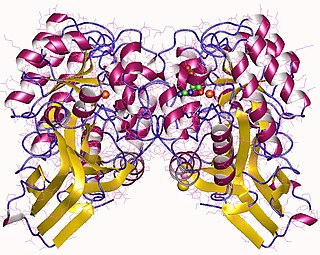| theanine hydrolase | |||||||||
|---|---|---|---|---|---|---|---|---|---|
| Identifiers | |||||||||
| EC no. | 3.5.1.65 | ||||||||
| CAS no. | 99533-51-4 | ||||||||
| Databases | |||||||||
| IntEnz | IntEnz view | ||||||||
| BRENDA | BRENDA entry | ||||||||
| ExPASy | NiceZyme view | ||||||||
| KEGG | KEGG entry | ||||||||
| MetaCyc | metabolic pathway | ||||||||
| PRIAM | profile | ||||||||
| PDB structures | RCSB PDB PDBe PDBsum | ||||||||
| Gene Ontology | AmiGO / QuickGO | ||||||||
| |||||||||
In enzymology, a theanine hydrolase (EC 3.5.1.65) is an enzyme that catalyzes the chemical reaction
- N5-ethyl-L-glutamine + H2O L-glutamate + ethylamine
Thus, the two substrates of this enzyme are N5-ethyl-L-glutamine and H2O, whereas its two products are L-glutamate and ethylamine.
This enzyme belongs to the family of hydrolases, those acting on carbon-nitrogen bonds other than peptide bonds, specifically in linear amides. The systematic name of this enzyme class is N5-ethyl-L-glutamine amidohydrolase. Other names in common use include L-theanine amidohydrolase, and 5-N-ethyl-L-glutamine amidohydrolase.




